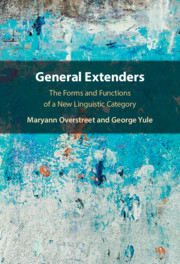Book contents
- General Extenders
- General Extenders
- Copyright page
- Contents
- Tables
- Acknowledgments
- Abbreviations
- 1 Introduction
- 2 Referential Function and Categorization
- 3 Interpersonal Function and Intersubjectivity
- 4 Personal Function and Subjectivity
- 5 Textual Function and Turn Construction
- 6 Historical Development and Change
- 7 Social Marking and Variation
- 8 In Different Languages
- 9 In Learner Language and Language Teaching
- 10 Reflections and Projections
- Notes
- References
- Index
8 - In Different Languages
Published online by Cambridge University Press: 20 August 2021
- General Extenders
- General Extenders
- Copyright page
- Contents
- Tables
- Acknowledgments
- Abbreviations
- 1 Introduction
- 2 Referential Function and Categorization
- 3 Interpersonal Function and Intersubjectivity
- 4 Personal Function and Subjectivity
- 5 Textual Function and Turn Construction
- 6 Historical Development and Change
- 7 Social Marking and Variation
- 8 In Different Languages
- 9 In Learner Language and Language Teaching
- 10 Reflections and Projections
- Notes
- References
- Index
Summary
Chapter 8 provides a report on versions of general extenders, that is, their translation equivalents, in languages other than English. There are studies of two Creoles, in Trinidad and Hawai‘i, with an analysis of the phonological processes involved in their development. Comparable expressions are documented in a variety of languages, including Brazilian Portuguese, French, German, Lithuanian, Persian, Russian, Spanish and Swedish. Notable differences between the expressions in Montreal French versus Parisian French are investigated. The relatively low frequency of disjunctive forms recorded in other languages is compared to English. Some observations are presented on where differences typically occur and the fact that several languages make use of interesting (non-referential) melodic expressions of a type not found in English, revealing some kind of aesthetic difference.
Keywords
- Type
- Chapter
- Information
- General ExtendersThe Forms and Functions of a New Linguistic Category, pp. 151 - 176Publisher: Cambridge University PressPrint publication year: 2021

